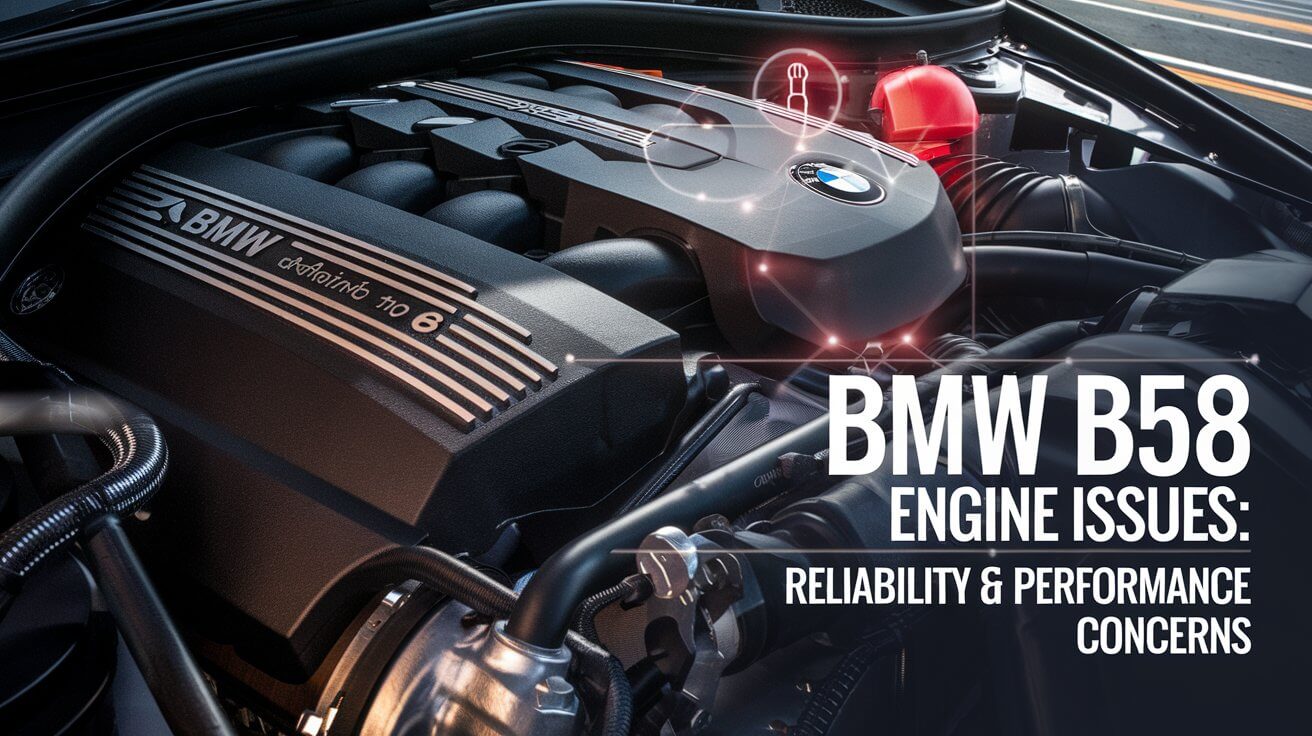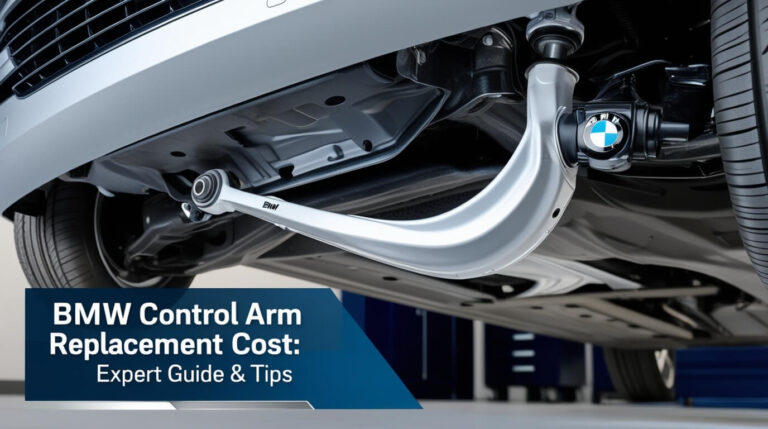
The BMW B58 engine packs a punch, but it’s not perfect. Car lovers praise its power, but some issues can pop up.
Want to know what goes wrong? Here’s the scoop:
- Coolant leaks
- Carbon gunk buildup
- Timing chain tensioner problems
- Oil drips
Let’s take a closer look at why these happen, how to spot them, and what you can do to fix them.
Introduction to the BMW B58 Engine
BMW’s B58 engine, a 3.0-liter inline-six turbocharged powerplant, first hit the roads in 2015. It quickly earned praise for its robust performance and improved reliability compared to its predecessors. But what makes this engine tick, and which vehicles sport this powerhouse under their hoods?
B58 Engine Specifications
The B58 boasts impressive specs:
- Displacement: 2998 cc
- Bore x Stroke: 82 mm × 94.6 mm
- Compression Ratio: 11.0:1
- Power Output: Varies by application, ranging from 322 to 382 hp
- Torque: 332 to 369 lb-ft
This engine uses a single twin-scroll turbocharger, direct fuel injection, and BMW’s Valvetronic variable valve lift system.
Vehicles Equipped with the B58 Engine
You’ll find the B58 engine purring under the hood of several BMW models:
- 2 Series: M240i
- 3 Series: 340i, M340i
- 4 Series: 440i
- 5 Series: 540i
- 7 Series: 740i
- X3: M40i
- X4: M40i
- X5: 40i
- X6: 40i
- Z4: M40i
It’s also the heart of the latest Toyota Supra, showcasing its versatility and appeal beyond BMW’s lineup.
Common BMW B58 Engine Problems
While the B58 is generally reliable, it’s not immune to issues. Let’s dive into the most frequent problems B58 owners might face.
Coolant Loss Issues
Some B58 owners report faster-than-normal coolant loss, even in low-mileage vehicles. This issue can stem from:
- Faulty coolant tank cap
- Damaged seals in the cooling system
- Small leaks in coolant hoses
While a slight coolant loss isn’t cause for panic, it’s crucial to monitor and top off when needed. Ignoring this can lead to overheating and potential engine damage.
Quick Tip: Check your coolant levels regularly, especially before long trips. If you notice frequent need for top-ups, have a mechanic inspect your cooling system.
Carbon Buildup on Intake Valves
The B58’s direct injection system, while efficient, can lead to carbon buildup on intake valves. Here’s why:
- Direct injection sprays fuel directly into the combustion chamber
- This leaves intake valves without the cleaning effect of fuel spray
- Oil blow-by naturally occurs, and oil can cake onto the intake valves
Symptoms of carbon buildup include:
- Rough idle
- Decreased performance
- Reduced fuel efficiency
- Engine misfires
Prevention involves regular carbon cleaning services or installing an oil catch can.
Timing Chain Tensioner Failure
The timing chain tensioner keeps proper tension on the timing chain, ensuring precise valve timing. Failure can lead to:
- Engine noise
- Rough running
- In severe cases, complete engine failure
Regular maintenance and attentive listening for unusual engine noises can help catch this issue early.
Oil Leaks and Control Issues
Some B58 owners report oil control problems, leading to:
- Oil coating the intercooler and charge piping
- Decreased engine performance
- Increased oil consumption
These issues often stem from worn seals or gaskets. Regular oil changes and using high-quality oil can help prevent these problems.
Less Frequent B58 Engine Concerns
While not as common, these issues can still crop up in B58 engines:
VANOS Solenoid Failures
BMW’s VANOS (Variable Nockenwellen Steuerung) system controls valve timing. Solenoid failures can cause:
- Loss of power
- Decreased fuel efficiency
- Check engine light activation
Regular oil changes with the correct oil grade can help prevent VANOS issues.
Valve Cover Gasket Leaks
As the engine ages, the valve cover gasket can degrade, leading to oil leaks. Signs include:
- Oil smell, especially after driving
- Visible oil on the engine
- Burning oil smell
This issue typically appears in higher-mileage B58 engines.
Oil Filter Disintegration
Some owners report oil filter disintegration, where the filter breaks down inside its housing. This can lead to:
- Reduced oil filtration
- Potential engine damage from debris
- Oil pressure issues
Using high-quality OEM filters and not exceeding oil change intervals can prevent this issue.
B58 Engine Reliability Compared to Predecessors
How does the B58 stack up against its older siblings? Let’s compare:
B58 vs. N55 Engine
The B58 improves upon the N55 in several ways:
- More robust internals
- Higher power output
- Better cooling system design
While both engines are relatively reliable, the B58 seems to have fewer oil-related issues than the N55.
B58 vs. N54 Engine
Compared to the notorious N54, the B58 is a significant leap forward:
- Fewer turbo-related problems
- Improved fuel injection system
- Better overall reliability
The B58 addresses many of the reliability concerns that plagued the N54, making it a more dependable choice for enthusiasts.
Preventing and Addressing B58 Engine Issues
Proactive maintenance is key to keeping your B58 engine running smoothly.
Proper Maintenance Schedule
Follow these guidelines:
- Oil changes: Every 5,000-7,500 miles
- Coolant checks: Every oil change
- Spark plug replacement: Every 60,000 miles
- Air filter replacement: Every 30,000 miles
High-Quality Parts and Fluids
Don’t skimp on quality:
- Use BMW-approved or high-quality synthetic oil
- Stick with OEM or reputable aftermarket parts
- Use the correct coolant specified by BMW
Early Warning Signs to Watch For
Stay alert for:
- Unusual engine noises
- Decreased performance
- Increased fuel consumption
- Warning lights on the dashboard
Addressing these early can prevent more serious issues down the road.
B58 Engine Tuning and Potential Risks
The B58’s robust design makes it popular for tuning, but modifications come with risks.
Popular Tuning Options
Common B58 mods include:
- ECU tunes
- Upgraded intercoolers
- Aftermarket downpipes
- Cold air intakes
These can significantly boost power output, but they may also increase stress on engine components.
Impact on Engine Longevity
While the B58 can handle moderate tuning well, excessive modifications may:
- Increase wear on engine internals
- Reduce overall engine lifespan
- Void manufacturer warranties
Always research thoroughly and use reputable tuners if you decide to modify your B58.
Cost of B58 Engine Repairs
When issues do arise, what can you expect to pay?
Common Repair Expenses
- Valve cover gasket replacement: $400-$700
- VANOS solenoid replacement: $300-$500
- Timing chain tensioner replacement: $1,000-$1,500
- Major engine overhaul: $5,000-$10,000+
These are rough estimates and can vary based on location and specific vehicle model.
Warranty Coverage for B58 Issues
New BMWs typically come with:
- 4-year/50,000-mile basic warranty
- 4-year/50,000-mile powertrain warranty
Some issues may be covered under warranty, potentially saving you thousands in repair costs.
Future of the B58 Engine
What’s next for this popular powerplant?
Ongoing Improvements and Updates
BMW continues to refine the B58:
- The B58TU1 update in 2019 brought improved emissions control
- Future updates may focus on increased efficiency and power output
B58 in Upcoming BMW Models
Expect to see the B58 in:
- Next-generation 3 and 4 Series models
- Updated X5 and X6 SUVs
- Possibly in hybrid configurations for improved fuel economy
Conclusion: Is the B58 Engine Reliable?
The BMW B58 engine, despite some known issues, stands as one of BMW’s more reliable modern engines. Its robust design, improved cooling system, and learnings from previous generations contribute to its overall dependability. While problems like coolant loss and carbon buildup can occur, proper maintenance and attentive care can mitigate many of these concerns.
For enthusiasts and everyday drivers alike, the B58 offers a compelling blend of performance and reliability. By staying informed about potential issues and adhering to recommended maintenance schedules, owners can enjoy the thrilling performance of the B58 while minimizing the risk of significant problems.
The B58 engine has quirks like any other. It delivers impressive power, offers tuning potential, and maintains solid reliability. These qualities have made it popular with BMW fans and other automotive enthusiasts.






